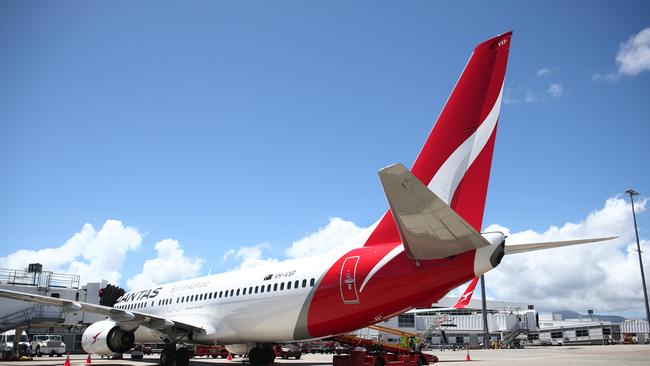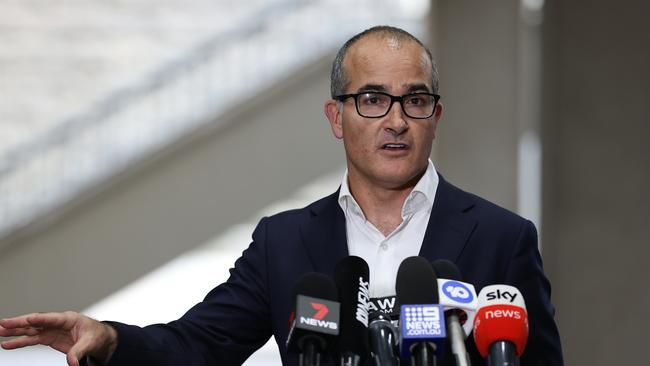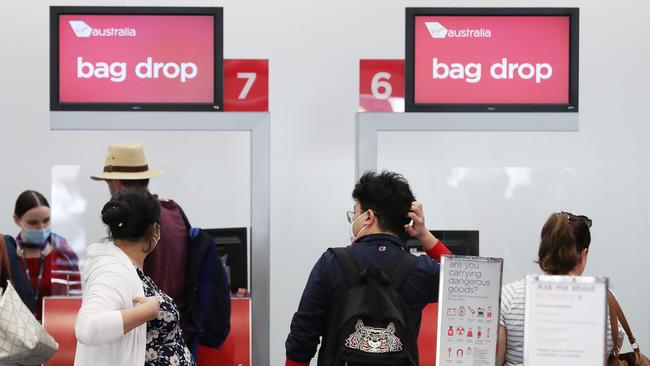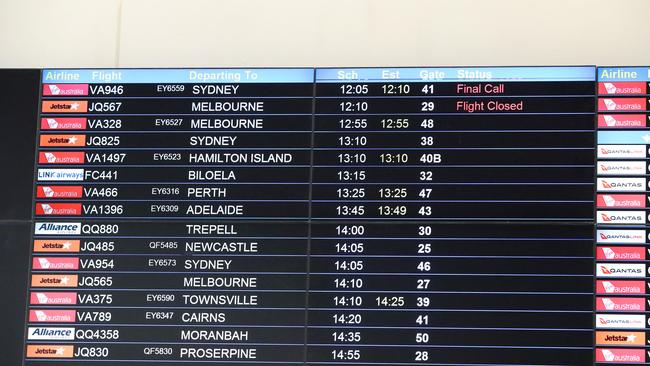Qantas, Virgin start cutting Melbourne flights
Airlines have begun axing flights in and out of Melbourne as the city prepares to enter another Covid-19 lockdown at midnight.

Airlines have begun axing flights in and out of Melbourne as the city prepares to enter a week long Covid-19 lockdown at midnight.
Shortly before acting Victorian premier James Merlino announced the state would enter lockdown until 11.59pm on June 3 or earlier if possible, Qantas cancelled 15 flights on Thursday, and Virgin Australia ten flights with both carriers expected to make further changes as the lockdown unfolds.
Regional Express (Rex) scrapped three Melbourne-Adelaide flights, in response to passenger cancellations, but was continuing with Melbourne-Sydney services for the time being.
Passengers on affected flights are being contacted by the airlines and offered refunds, rebookings or travel credits.
Virgin Australia has urged passengers to avoid contacting the call centre, if they are not travelling in the next 72-hours to limit call-waiting times.
“While most services in and out of Melbourne today are operating as normal, we are adjusting our forward schedule to better reflect changing travel demand and booking trends,” said a Virgin Australia spokesman.
Previous lockdowns have cost airlines millions of dollars in lost revenue, with Qantas revealing the three-day Brisbane lockdown before Easter amounted to a $29m blow to earnings.
In a statement Mr Merlino said Victorians from 11.59pm tonight will only be able to leave home for food and supplies, authorised work, caregiving, exercise for up to two hours with one other person and for vaccinations.

“Exercise and shopping will be limited to give kilometres from home,” he said.
“If there’s no shops in your 5km radius, you can travel to the ones closest to you. Shopping is also limited to one person per day, per household.”
Private and public gatherings will not be permitted.
Despite the tight restrictions on economic activity, economists believe the impact will be relatively minor.
National Australia Bank chief economist Alan Oster said the economic impacts of a snap seven day lockdown would be small on an economy-wide scale, but noticeable in pockets of the economy.
“You might knock 1 per cent off Victoria’s GDP in the quarter, and Victoria is 30 per cent of the Australian economy, so overall you get 0.2 per cent, maybe 0.3 off GDP in that quarter,” he said.
“It will be painful for some people, particularly for small business, but if you had to guess across Australia you wouldn’t guess big numbers. Beyond that, I believe people are just making up numbers.”
The Melbourne-based Mr Oster said the impact the lockdown will have on consumer and business sentiment is harder to quantify, but it would likely not be as large as in previous lockdowns in Victoria.
“I just went down to the local Safeways and didn’t have any problem buying toilet paper,” he said.
“People are a little more resilient and getting used to it.”
AMP Capital chief economist Shane Oliver also said a short lockdown wouldn’t impact the economy too heavily.
“The history of economic lockdowns in Australia is that they are relatively minor,” he said.
“We have seen several over the last six months, we’ve had quite a few, and while they are horrible while they happen the economic impact is quite minor, the economic indicators perk up once they are over.
“There was talk about last year’s lockdown in Victoria costing $10bn to $15bn. I’d say this cost will be probably less than $1bn - If it is just seven days, probably only a few hundred million in economic cost.”


Meanwhile, a third Qantas repatriation flight from India is due to land in Melbourne this afternoon.
The flight is believed to be full but some questions remained over whether the service would be sent elsewhere in light of Melbourne’s looming lockdown.
Qantas directed inquiries about the flight to the Department of Foreign Affairs and Trade.
The seven-day lockdown comes just as Melbourne Airport was seeing a rebound in domestic travellers following a frightful 2020.
Sydney-Melbourne returned to the world’s top five busiest air routes in May, with capacity of more than 600,000 seats for the month.
The Australian Retailers Association said the Victorian lockdown that starts from midnight is a devastating blow for retailers, will cost more than $1 billion in lost trade and again highlights the threat of Covid is far from over.
The end of the JobKeeper program in March would also leave businesses without a lifeline.
Crown Resorts, which received more than $200m in JobKeeper amid lockdowns last year said it would close its gaming, retail, food and drink facilities - except for some takeaway businesses - but continue paying staff.
Its hotel accommodation will remain open for “approved purposes”.
“Crown Melbourne will pay employees’ rostered hours and salaries (as applicable) over this period,” the company said.
ARA chief executive Paul Zahra said the seven-day lockdown is set to cost over a billion dollars in terms of lost retail trade.
“We support the Victorian Government in their response to keep the community safe, but we can’t ignore the significant impact this lockdown will have on retailers, the Melbourne CBD and small businesses in particular,” Mr Zahra said.
“Victorians have been to hell and back over the past year or so, and just when we thought the worst of Covid was behind us, it’s reared its head again mid-year. Businesses no longer have JobKeeper support payments available to them and Victorian small businesses in particular will be under significant stress – this is a huge blow to their confidence.”
National Retail Association CEO Dominique Lamb said that Victorian retailers are hopeful that the new round of restrictions will be short and successful, but many remain nervous given there is no assistance measures in place.
“The pandemic has wreaked havoc across the entire country over the last 12 months, but none more so than Victoria,” Ms Lamb said.
“Foot traffic across major shopping precincts worsens with each lockdown, the Melbourne CBD has tracked consistently at 40 per cent below pre-pandemic levels.”
Additional reporting by Eli Greenblat



To join the conversation, please log in. Don't have an account? Register
Join the conversation, you are commenting as Logout